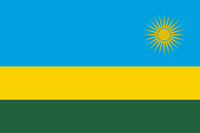Rwanda
Rwanda became independent from Belgium-administered UN trusteeship on 1 July 1962.
Prior to independence, in 1959, the Hutus who are majority ethnic group in Rwanda, overthrew the ruling Tutsi king. Over the next few years, thousands of Tutsis were killed or driven into exile in neighboring countries.
The exiled Tutsi and their children formed the Rwandan Patriotic Front (RPF) who began civil war in 1990. Ethnic tensions escalated and culminated in military-orchestrated genocide in which around 1 million Rwandans were killed, including three quarters of the Tutsi population.
The genocide ended after the RPF defeated the national army and Hutu militias and war ended on 16 July 1994. An RPF-led government of national unity was established. Rwanda held its first local elections in 1999 and its first post-genocide presidential and legislative elections in 2003.
Rwanda has participated in military operations with the DR Congo against Hutu extremists who remain in DR Congo and who seek to regain Rwanda.
Rwanda has a mixed legal system of civil law, based on German and Belgian models, and customary law. An International Tribunal for the prosecution of perpetrators of serious violations of international criminal and humanitarian law committed in Rwanda was established in late 1994.
Rwanda has a constitution dating from 2003 which has provisions providing that no person shall be subjected to torture, physical abuse or cruel, inhuman or degrading treatment.
The laws of Rwanda are available here.

